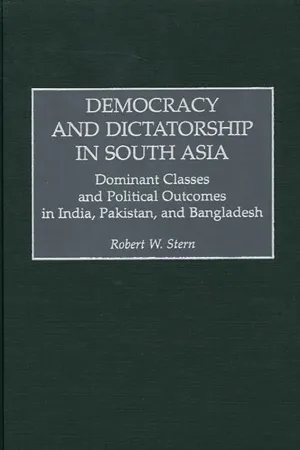
Democracy and Dictatorship in South Asia
Dominant Classes and Political Outcomes in India, Pakistan, and Bangladesh
- 208 pages
- English
- PDF
- Available on iOS & Android
Democracy and Dictatorship in South Asia
Dominant Classes and Political Outcomes in India, Pakistan, and Bangladesh
About this book
In reaction to British imperialism during the 19th and 20th centuries, Indian Muslims and Hindus imagined and invented their separate and distinct religious communities and communal nationalisms. These were institutionalized in the subcontinent's political systems by the British government in collaboration with Indian politicians. Stern argues that this production of communalism has been crucial in structuring the composition and organization of South Asia's politically dominant classes, and that they, in turn, have been crucial in determining parliamentary democracy's growth or atrophy on the subcontinent. In what became India, the overwhelmingly Hindu National Congress formed a coalition of professionals and landed peasants, later joined by industrialists, that was friendly to the development of parliamentary democracy. In its western provinces, Pakistan's legacy from British government was a ruling coalition of landlords and civilian and military bureaucrats that has continued to impede the development of parliamentary democracy. Until 1971, this coalition equated parliamentary democracy with the loss of their dominance to Pakistan's Bengali majority. Only among them, in Pakistan's eastern province, now Bangladesh, was there a politically dominant coalition of classes that was friendly to the development of parliamentary democracy. It had the ironic effect in Pakistan of entrenching the west's anti-democratic coalition. Dogged by the legacies of twenty-four years as Pakistan's subordinate province, disorganization among its dominant classes and a vanished rural base, the development of parliamentary democracy in Bangladesh has been slow and uneven.
Frequently asked questions
- Essential is ideal for learners and professionals who enjoy exploring a wide range of subjects. Access the Essential Library with 800,000+ trusted titles and best-sellers across business, personal growth, and the humanities. Includes unlimited reading time and Standard Read Aloud voice.
- Complete: Perfect for advanced learners and researchers needing full, unrestricted access. Unlock 1.4M+ books across hundreds of subjects, including academic and specialized titles. The Complete Plan also includes advanced features like Premium Read Aloud and Research Assistant.
Please note we cannot support devices running on iOS 13 and Android 7 or earlier. Learn more about using the app.
Information
Table of contents
- Contents
- Acknowledgments
- 1 Dominant Class Coalitions: The Argument and Its Historical Contexts
- 2 "Communalism" and Coalitions of Dominant Classes
- 3 Punjab and Bengal
- 4 Democracy in India
- 5 Pakistan and Bangladesh
- 6 Does Parliamentary Democracy Matter?
- Bibliography
- Index